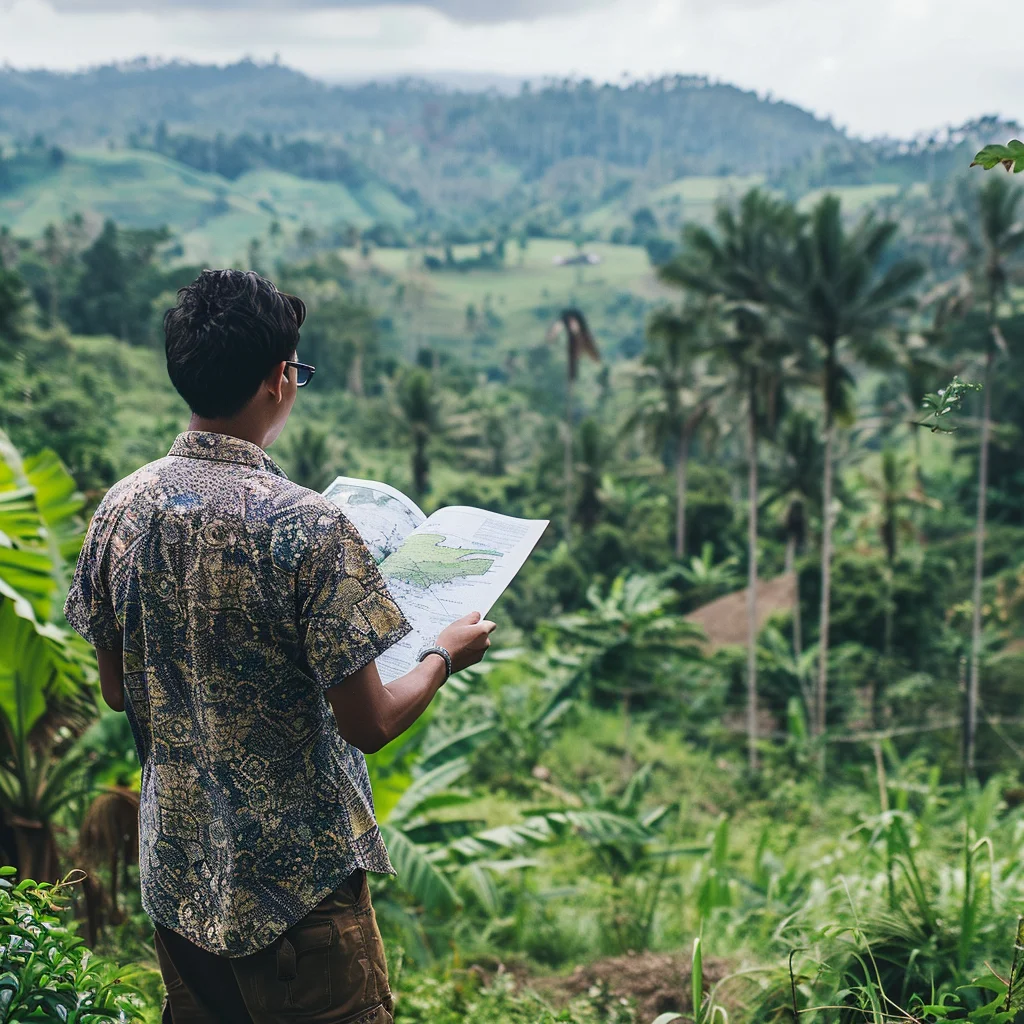Last Updated on September 16, 2024 by Yasmina
In Indonesia, notaries play a crucial role in property transactions by acting as legal intermediaries who ensure that all documents and procedures comply with the law. Their involvement is essential for safeguarding the interests of both buyers and sellers, especially in Lombok, where property laws can be complex and subject to local regulations.
This guide explores the various notary responsibilities in property transactions, highlighting their importance and how they help facilitate smooth and legally sound real estate deals.
Table of Contents
1. Legal Authentication of Documents
One of the primary notary responsibilities in property transactions is the legal authentication of documents. In Indonesia, only notaries have the authority to certify and authenticate certain legal documents, making their involvement mandatory for property transactions.
A. Sale and Purchase Agreement (Akta Jual Beli – AJB)
Overview:
The Sale and Purchase Agreement (Akta Jual Beli – AJB) is the official document that transfers property ownership from the seller to the buyer. A notary is responsible for drafting, witnessing, and authenticating this agreement, ensuring that it meets all legal requirements.
Importance:
- Legal Validity: The AJB is not legally binding without a notary’s authentication. This document is essential for registering the property transfer with the Indonesian Land Office (BPN).
- Protection: The notary ensures that the terms of the agreement are clear and fair, protecting both parties from potential disputes.
Example:
When buying a villa in Lombok, the notary prepares the AJB, reviews the terms with both parties, and ensures that the document is signed and notarized in accordance with Indonesian law.
B. Deed of Lease (Akta Sewa Menyewa)
Overview:
For leasehold agreements, the Deed of Lease (Akta Sewa Menyewa) is another crucial document that a notary must authenticate. This deed formalizes the lease agreement between the property owner and the lessee.
Importance:
- Legal Binding: The notary’s authentication makes the lease agreement legally binding, ensuring that both parties are protected under Indonesian law.
- Clarification of Terms: The notary helps clarify the terms of the lease, such as the lease period, rental payments, and renewal options, to prevent misunderstandings.
Example:
A foreign investor leasing land in Lombok for 30 years would work with a notary to draft and authenticate the Deed of Lease, ensuring that the agreement is legally enforceable.
2. Ensuring Compliance with Indonesian Law
Notaries in Indonesia ensure that all aspects of a property transaction comply with national and local laws. This includes verifying that the transaction is lawful and that all necessary permits and approvals are in place.
A. Title Verification
Overview:
One of the key notary responsibilities is verifying the property title’s legitimacy. This involves checking the title’s authenticity, ensuring that it is free from encumbrances, and confirming that the seller has the legal right to transfer ownership.
Importance:
- Prevention of Fraud: Title verification helps prevent fraud and ensures the buyer purchases a property with a clear and legitimate title.
- Legal Security: The notary’s verification protects the buyer from future disputes over ownership.
Example:
Before finalizing the purchase of a plot of land in Lombok, the notary will conduct a title search to confirm that the title is valid and that there are no outstanding claims or liens on the property.
B. Compliance with Zoning and Land Use Regulations

Overview:
Notaries also ensure that the property complies with local zoning and land use regulations. This is particularly important in Lombok, where zoning laws can vary by region and affect how the property can be used.
Importance:
- Avoiding Legal Issues: Compliance with zoning laws ensures that the property can be used for the intended purpose, whether residential, commercial, or agricultural.
- Legal Advice: The notary can advise whether the property meets zoning requirements or if additional permits are needed.
Example:
A notary might advise a buyer on whether a property in South Lombok is zoned for tourism-related development, ensuring that the buyer can legally build a hotel or resort on the land.
3. Facilitating the Transfer of Ownership
The transfer of property ownership in Indonesia involves several legal steps, all of which require the involvement of a notary. The notary is a facilitator, ensuring the transfer is conducted smoothly and legally.
A. Registration of Property Transfer
Overview:
Once the Sale and Purchase Agreement (AJB) is signed and notarized, the notary is responsible for registering the property transfer with the local land office (BPN). This step is essential for the legal recognition of the new owner.
Importance:
- Legal Ownership: Registration with the BPN finalizes the transfer of ownership, making the buyer the official owner of the property.
- Avoiding Disputes: Proper registration helps avoid future disputes over ownership and ensures that the property is correctly recorded in government records.
Example:
After purchasing a villa in Senggigi, the notary submits the AJB to the local land office for registration, officially transferring the title to the new owner.
B. Payment of Taxes and Fees
Overview:
Notaries also assist with paying taxes and fees associated with property transactions. This includes calculating the transfer tax (BPHTB), ensuring that all taxes are paid on time, and providing receipts for tax payments.
Importance:
- Tax Compliance: The notary ensures that both the buyer and seller comply with their tax obligations, preventing legal issues related to unpaid taxes.
- Accurate Calculation: The notary calculates the correct amount of taxes and fees, ensuring that there are no discrepancies or overpayments.
Example:
When finalizing a property purchase, the notary calculates the transfer tax and ensures that it is paid to the tax authorities before the transaction is completed.
4. Mediating Between Parties
Notaries in Indonesia often act as neutral mediators in property transactions, ensuring that both the buyer and seller are treated fairly and that any disputes are resolved amicably.
A. Clarifying Contract Terms
Overview:
The notary’s role includes explaining and clarifying the terms of the contract to both parties, ensuring that they fully understand their rights and obligations. This helps prevent misunderstandings and ensures that the agreement is fair.
Importance:
- Transparency: By explaining the contract terms in detail, the notary promotes transparency and ensures that both parties are fully informed.
- Dispute Prevention: Clear communication and understanding of the contract can prevent disputes from arising later in the process.
Example:
If the payment terms in the Sale and Purchase Agreement are unclear, the notary will clarify them for both the buyer and seller, ensuring that everyone is on the same page.
B. Resolving Disputes
Overview:
If disputes arise during the transaction, the notary can help mediate and resolve these issues. This could involve renegotiating contract terms, addressing concerns about property conditions, or clarifying legal notary responsibilities.
Importance:
- Conflict Resolution: The notary’s impartiality makes them well-suited to mediate disputes and find solutions that satisfy both parties.
- Smooth Transaction: The notary helps ensure that the transaction proceeds without unnecessary delays by resolving disputes quickly and fairly.
Example:
If a buyer discovers an issue with the property after signing the agreement, the notary can mediate a resolution, such as negotiating repairs or adjusting the sale price.
5. Protecting the Interests of Foreign Buyers
Navigating Indonesia’s property laws can be particularly challenging for foreign buyers. Notaries play a vital role in protecting the interests of foreign investors by ensuring that the transaction complies with legal restrictions and that the buyer’s rights are safeguarded.

A. Advising on Foreign Ownership Laws
Overview:
Notaries know Indonesia’s foreign ownership laws and can advise buyers on the legal structures available for owning property, such as leasehold agreements or setting up a foreign-owned company (PT PMA).
Importance:
- Legal Compliance: The notary ensures that foreign buyers comply with Indonesian property laws and that the ownership structure is legally sound.
- Risk Mitigation: The notary helps mitigate the risks associated with foreign ownership by advising on the appropriate legal structure.
Example:
A notary might advise a foreign buyer to purchase a property under a leasehold agreement (Hak Sewa) to comply with Indonesian law and avoid potential legal issues.
B. Drafting and Reviewing Legal Documents
Overview:
Notaries draft and review all legal documents related to the transaction, ensuring that they are tailored to the specific needs of foreign buyers and comply with Indonesian law.
Importance:
- Custom Legal Solutions: The notary can draft documents that address the unique concerns of foreign buyers, such as protecting their investment or ensuring that the property can be transferred or sold in the future.
- Legal Protection: Reviewing documents ensures that the buyer’s interests are fully protected and that the transaction is legally binding.
Example:
A notary drafts a leasehold agreement that includes provisions for lease renewal and the option to sell the lease, providing the foreign buyer with flexibility and legal security.
6. Safekeeping of Documents
Notaries in Indonesia are also responsible for the safekeeping of important legal documents related to property transactions. This includes maintaining copies of the Sale and Purchase Agreement, title deeds, and other relevant documents.
A. Document Retention
Overview:
The notary retains copies of all legal documents related to the transaction for a specified period, ensuring they are available if needed.
Importance:
- Legal Security: Having access to notarized copies of documents provides legal security in case of disputes or future property transactions.
- Record Keeping: Proper record keeping by the notary ensures that important documents are not lost or misplaced.
Example:
Years after purchasing a property, the buyer can request a copy of the Sale and Purchase Agreement from the notary if they need it for legal or financial purposes.
Conclusion
Notaries play a central role in property transactions in Lombok, ensuring that all legal requirements are met and that both buyers and sellers are protected. From drafting and authenticating documents to ensuring compliance with Indonesian law, notaries help facilitate smooth and secure real estate deals. Whether you’re a local buyer or a foreign investor, working with a reputable notary is essential for navigating the complexities of property transactions in Lombok and ensuring a successful investment.
About Nour Estates
We started Nour Estates with a simple idea: to make finding your dream property in Indonesia as easy and enjoyable as a day at the beach. Our team is a mix of local folks and people from around the world who fell in love with Indonesia just like you. We’ve been in your shoes, faced the challenges of buying land here, and learned all the ins and outs. Now, we’re here to share that knowledge with you.
We are here to find you the perfect property to invest in. Contact us today, and let’s start this exciting journey together!















































































